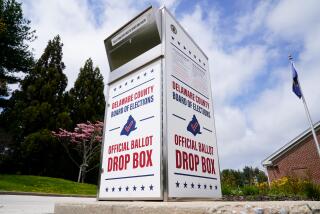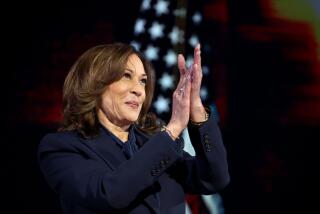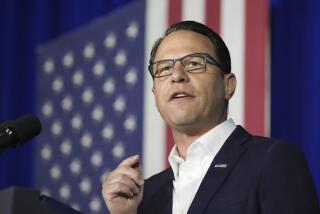Romney repudiates idea of using ties to pastor against Obama
WASHINGTON — “Super PACs,” the free-ranging groups formed to exploit a new era of unbridled campaign spending, have dominated the 2012 presidential race, buoying a succession of Republican candidates and helping propel Mitt Romney to the party’s nomination.
But the bombs-away mentality threatened to blow up on Romney on Thursday when plans surfaced for an ad blitz reminding voters of President Obama’s past ties to the Rev. Jeremiah A. Wright Jr., his controversial former Chicago pastor.
Within hours of a New York Times report, Romney had condemned the plan — put forth independent of the campaign — and the proposed billionaire funder had also rejected the strategy.
“I want to make it very clear I repudiate that effort,” Romney told reporters at a campaign stop in Jacksonville, Fla. “I think it’s the wrong course for a PAC or a campaign. I hope that our campaigns can respectively be about the future, and about issues and about a vision for America.”
Still, by briefly dominating the presidential race and throwing the former Massachusetts governor on the defensive, the episode underscored the changes wrought in this new age of campaign financing, which arose from a series of court decisions allowing individuals and corporations to pour unlimited sums into independent groups.
“It shows how on any given day, any wealthy person has the ability to totally take over the dialogue of even the presidential campaign,” said Steve Schmidt, a GOP strategist who managed Republican John McCain’s 2008 White House bid.
The ad campaign, conceived by Fred Davis, a Hollywood-based consultant who also worked on the McCain campaign, was proposed to a group funded by Joe Ricketts, a Wyoming-based billionaire who founded the brokerage firm TD Ameritrade. The $10-million effort, timed for this summer’s Democratic National Convention, promised to show Wright and his influence on Obama “for the first time in a big, attention-arresting way.”
“Our plan is to do exactly what John McCain would not let us do,” read Davis’ pitch, referring to the candidate’s refusal to use the issue in his advertising. “Show America how Barack Obama’s opinions of America and the world were formed. And why the influence of that misguided mentor and our president’s formative years among left-wing intellectuals has brought our country to its knees.”
The proposal was titled “The Defeat of Barack Hussein Obama” and characterized the president as a “metrosexual black Abe Lincoln.”
A Ricketts spokesman issued a statement saying the proposal “reflects an approach to politics that Mr. Ricketts rejects, and it was never a plan to be accepted but only a suggestion for a direction to take.”
Davis, reached after Romney and Ricketts had both repudiated the plan, had no comment. A statement from his firm noted that the Ricketts family never approved the proposal, although the document obtained by the New York Times indicated that “preliminary approval” had been given at a New York meeting.
Wright was a spiritual mentor to Obama for two decades. Their relationship became an issue in the 2008 campaign after clips of the minister’s fiery sermons, including portions in which he damned America, were widely circulated on TV and the Internet. Obama then severed his ties with Wright and said he had never heard those kind of denunciations from the pulpit.
McCain said Thursday he stood by his refusal to air spots focused on the Obama-Wright relationship. Others were not as reticent. A privately funded political action committee broadcast a spot in the final days of the 2008 campaign showing footage of Wright sermonizing as well as photographs of the pastor and Obama together. “Barack Obama,” said the tag line. “Too radical. Too risky.”
Strategists on both sides of the contest agreed the issue was not especially potent then and it would not be now, they said Thursday.
“Everyone had an opinion on it. There were not any persuadable or undecided voters on the question,” Schmidt said. “Forward four years later. [Obama] has not been associated with Rev. Wright. He’s been commander in chief. There are legitimate criticisms to be made of this president, but this isn’t one of them. It’s totally distracting and today this idiocy will prevent Mitt Romney from delivering an economic message which he needs to deliver every day in order to win the presidency.”
It was telling that the Obama campaign promoted the story on Twitter and through other outlets, while the Romney team was quick to disavow the proposal. Speaking privately, one Romney strategist called the plan “boneheaded” and “stupid.” “You can’t introduce ‘new’ information about Wright and hope to change minds,” the advisor said.
Others saw a different cause for concern.
Campaign finance reform advocates said the events vividly illustrate the effect that outside groups with unlimited resources can have on the White House contest. “It certainly is going to make it coarser and nastier” and possibly less relevant to the concerns of average voters, said David Donnelly, executive director of the Public Campaign Action Fund.
So far, outside organizations, including super PACs and tax-exempt advocacy organizations, have poured a record $124 million into the 2012 campaign, more than twice the amount spent by independent groups at this point in 2008, according to data compiled by the nonpartisan Center for Responsive Politics.
While independent interests have played a growing role in national campaigns in the last decade, their influence was greatly expanded in 2010 after federal court decisions — including the Supreme Court’s ruling in the Citizens United case — led to the creation of super PACs.
Those committees, which can accept unlimited donations as long as they do not coordinate with candidate campaigns or the political parties, played an outsized role in the GOP primaries.
The super PAC backing Romney has served as the main vehicle of attack against his rivals, shredding opponents with an unending barrage of negative ads.
The groups have been financed largely by a small cadre of rich individuals, including Dallas billionaire Harold Simmons and Las Vegas casino magnate Sheldon Adelson.
Ricketts now appears intent on joining their ranks. His family is especially prominent in Chicago, where it owns baseball’s Cubs. Joe Ricketts’ son Tom is a Republican donor. A daughter, Laura Ricketts, is a major fundraiser for Obama. She told the Chicago Tribune that her family members, like most, don’t always agree on politics.
“My view is that the president is doing a wonderful job,” she said. “He’s a great leader.”
Barabak reported from San Francisco and Gold from Washington.
Staff writers Melanie Mason and Maeve Reston and Chicago Tribune reporter Melissa Harris contributed to this report.
More to Read
Sign up for Essential California
The most important California stories and recommendations in your inbox every morning.
You may occasionally receive promotional content from the Los Angeles Times.











